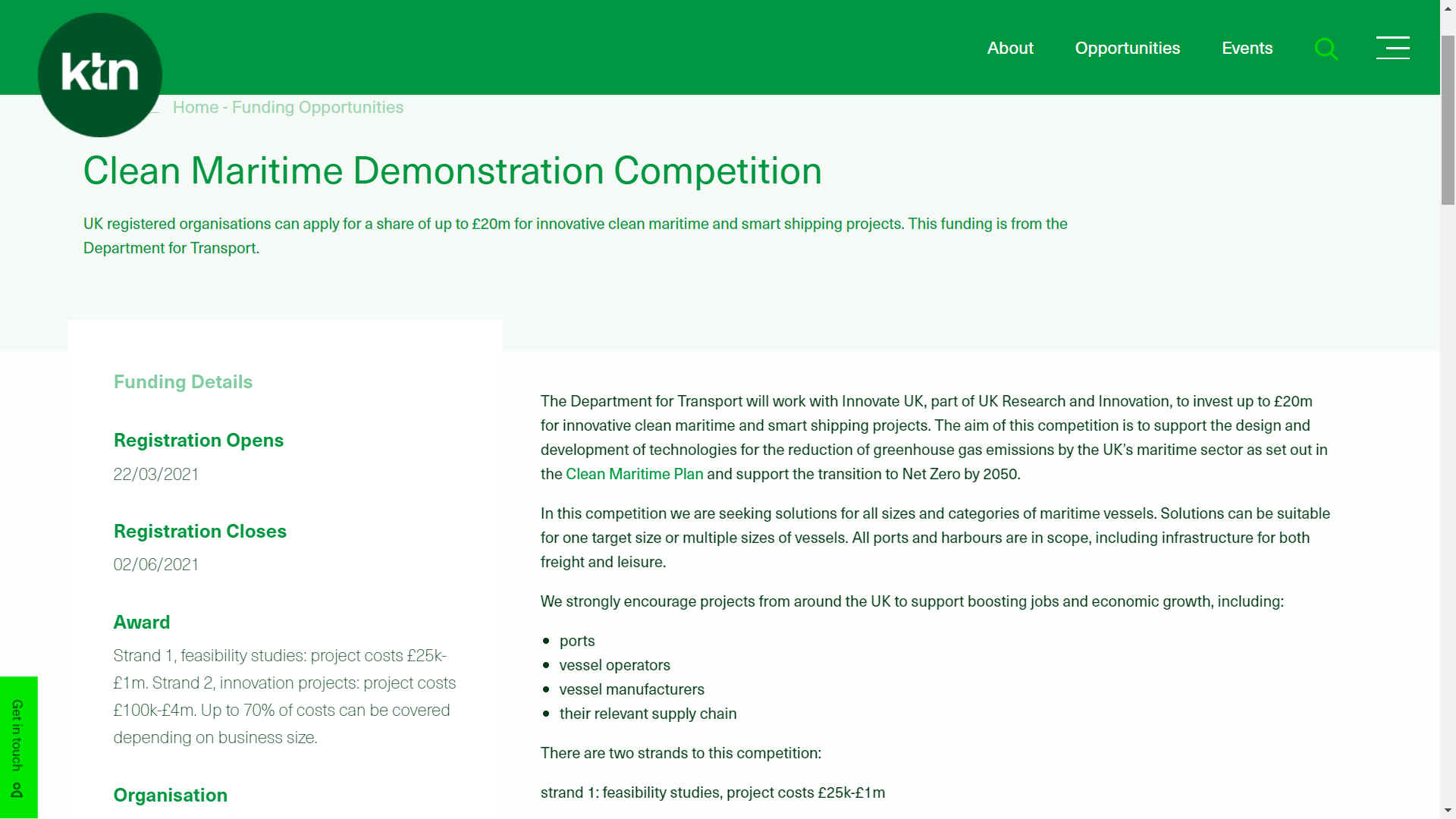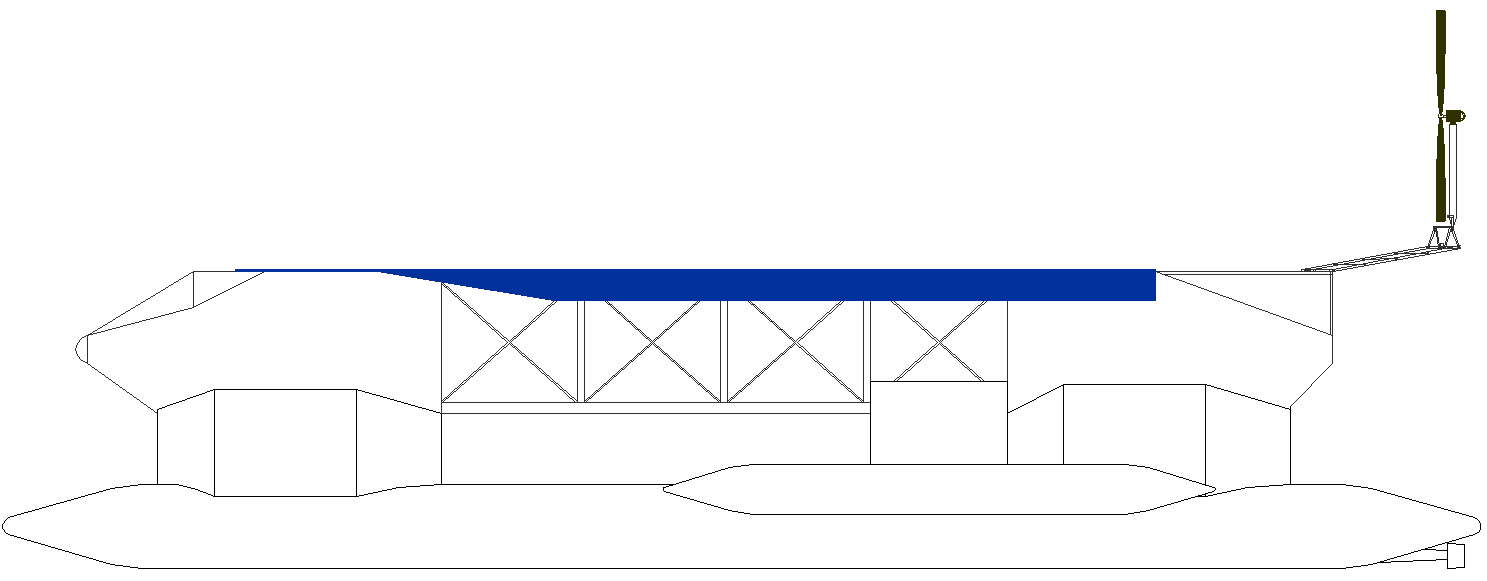
..
Registration Opens:
22/03/2021
Registration Closes: 02/06/2021
Award: Strand 1, feasibility studies: project costs £25k-£1m. Strand 2, innovation projects: project costs £100k-£4m. Up to 70% of costs can be covered depending on business size.
Organisation: DFT
KTN: Knowledge Transfer Network is Innovate UKs network partner, and also provides innovation networking for other funders in line with its mission to drive UK growth.
If youd like to know more about how the KTN could help, or if you have any general queries, please get in touch and let us know what you are working on.
CLEAN MARITIME DEMONSTRATION COMPETITION
UK registered organisations can apply for a share of up to £20m for innovative clean maritime and smart shipping projects. This funding is from the Department for Transport.
The Department for Transport will work with
Innovate
UK, part of UK Research and Innovation, to invest up to £20m for innovative clean maritime and smart shipping projects. The aim of this competition is to support the design and development of technologies for the reduction of greenhouse gas emissions by the UKs maritime sector as set out in the Clean Maritime Plan and support the transition to Net Zero by 2050.
In this competition we are seeking solutions for all sizes and categories of maritime vessels. Solutions can be suitable for one target size or multiple sizes of vessels. All ports and harbours are in scope, including infrastructure for both freight and leisure.
We strongly encourage projects from around the UK to support boosting jobs and economic
(blue) growth, including:
ports
vessel operators
vessel manufacturers
their relevant supply chain
There are two strands to this competition:
strand 1: feasibility studies, project costs £25k-£1m
strand 2: innovation projects, project costs £100k-£4m
Your project can start from 1 September 2021, must end by 31 March 2022, and can last up to 7 months.
To lead a project or work alone your organisation must:
be a UK registered business of any size, a research organisation or a research and technology organisation (RTO)
carry out its project work in the UK
intend to exploit the results from or in the UK
If the lead organisation is an RTO or a research organisation it must collaborate with at least 1 business.
Academic institutions cannot work alone.
To collaborate with the lead, your organisation must:
be a UK registered business, research organisation, academic institution, charity, not-for-profit, public sector organisation or research and technology organisation (RTO)
carry out its project work in the UK
intend to exploit the results from or in the UK
There is no limit on the number of applications an organisation can participate in.
For strand 1, your project must:
review the technical and economic feasibility of solutions to reduce greenhouse gas emissions
develop a clear plan for a future technology demonstration to be deployed after the feasibility project has been completed
For strand 2, your project must design, develop and test novel clean maritime or smart shipping technologies that reduce greenhouse emissions:
from vessels
from shore-side infrastructure at ports and harbours
SCOPE OF PROJECTS
Your project for strand 1 or 2 can focus on one or more of the following themes:
On-vessel low and zero emission
technologies:
vessel propulsion (battery, fuel
cell, hybrid, or engines using low carbon alternative fuels such as hydrogen, methanol or ammonia)
propulsion systems using internal combustion engine technology capable of using multiple fuels including zero carbon options (such as hydrogen, methanol, ammonia)
wind
propulsion, including soft-sail, fixed-sail, rotor, kite and turbine technologies, targeting a range of ship types from small vessels to large cargo carriers, both as primary and auxiliary propulsion
on-vessel power generation and fuel production to reduce GHGs e.g.
wind
turbines, solar
panels, synthetic fuel production
low carbon energy storage and management
physical connections to shore-side power, including fuelling lines
enabling technologies such as motors, drives and power electronics
Port and shore-side solutions:
shore-side low and zero carbon fuelling including bunkering of such fuels
charging infrastructure and management
low and zero emission shore-side power solutions, such as enabling docked vessels to turn off their conventional power supply for ancillary systems
shore-side renewable energy generation at the port to supply vessels
zero emission shore-side power supply as vessels are in harbour for the vessels main propulsion system, including grid or renewable energy supply
low carbon fuel production (such as hydrogen, methanol, ammonia)
zero emission infrastructure, including stationary assets for freight handling and port operations
Smart shipping technologies:
autonomy, digitisation and better journey efficiencies directly and indirectly delivering quantifiable energy efficiency savings and, therefore, GHG emission reductions
other smart shipping technologies, including the control of the emission reduction systems including but not limited to wind propulsion
The above are all in scope for both strand 1 and strand 2.
For strand 1 only, your project could also focus on:
Investigating green shipping corridors between the UK and other trading partners:
assessing the potential of specific technologies in decarbonising trade routes between the UK and trading partners, geographically both near and far
exploring barriers to the decarbonisation of trade routes
exploring how innovative technologies or the novel application of existing technologies will address the barriers, enabling the creation of green corridors between the UK and its trading partners
For any further queries, feel free to contact Matthew Moss, KTM Maritime.
(+44) 03333 403250
An online briefing event was held on 29th March 2021, 10am-12.30pm: click here for details. The recording of the event will also be available at that link.
APPLY: STRAND 1 (feasibility studies, £25k-£1m)
SUMMARY
- ELIGIBILITY -
SCOPE -
HOW TO APPLY -
SUPPORT
- COSTS
- EDGE
APPLY: STRAND 2 (innovation projects, £100k-£4m)
SUMMARY
- ELIGIBILITY - SCOPE - HOW TO APPLY - SUPPORTING INFORMATION

INHIBITING
CURRENT RULES : The
Elizabeth Swann is shown above is a zero emissions vessel, using only
solar and wind power for propulsion, but under current EU point scoring,
she'd have little chance of securing funding. This is why we are
inviting other forms of collaboration, including corporate branding
opportunity.
UK'S
CLEAN MARITIME SHIPPING PLAN
INTRODUCTION:
1 - 13
SECTION 1 - TACKLING EMISSIONS:
14
- 50
SECTION 2 - OUR APPROACH:
51 - 58
SECTION 3 - ECONOMICS:
59 - 95
SECTION 4 - INFRASTRUCTURE:
96 - 120
SECTION 5
INNOVATION: 121 - 129
SECTION 6 -
REGULATION: 130 - 138
SECTION 7 - NEXT
STEPS: 139 - 140
MAP - THE 2050 PLAN RECOMMENDATIONS
GLOSSARY
END
NOTES REFERENCE LINKS
HORIZON EUROPE
Horizon Europe is the EU's
100 billion euro research and innovation programme starting in
2021, 35% of which is allocated to achieving climate objectives.
LINKS
& REFERENCE
https://ktn-uk.org/opportunities/clean-maritime-demonstration-competition/
Please use our
A-Z INDEX to
navigate this site

